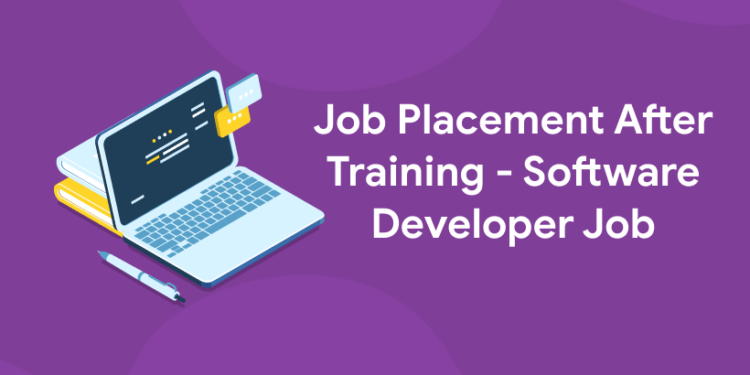Table of Contents
If you’re starting out in the world of software development, you may find yourself struggling to land your first job. Whether you’re fresh out of college or doing an internship, the competition can be tough. This can be especially discouraging if you have limited experience and have yet to build up a portfolio of relevant projects to show potential employers. With some careful planning and preparation, however, it should be possible to land your dream job as a software developer. If you are new to the industry and don’t have much experience under your belt. While most companies looking to hire developers look primarily at your credentials and experience level, it’s just as important to approach the job search process in the right way to maximize your chances of getting an offer. In this article, we’ve outlined ten critical steps you can take during the job search process to increase your chances of getting hired by software development employers and allow you to start writing code as soon as possible! Read on! There are a lot of tips and tricks out there, but it can be hard to sift through all the opinions and advice to find what really works in the real world. Let us help you out with this list of 10 tips that will make your job search much easier and more likely to result in an offer letter in hand!
1) How To Start
1: Which of the following data structures allows elements to be added and removed in a Last-In, First-Out (LIFO) order?
After software developer training and certification, your next step is to start looking for an entry-level software developer job. Software development jobs are often competitive; knowing how to find, apply for, and land an entry-level position can help increase your odds of success. Here’s how to go about it: 1. Create a Job Search Plan Some people take years to land their first job in software development, so you should have a plan—or at least know what you’re going to do next. It’s best if you can have multiple options or paths from which to choose. A lot of people get stuck by making all-or-nothing choices—and then doing nothing when things don’t work out in their favor right away. Keep in mind that finding a job doesn’t happen overnight, so be patient and set realistic expectations. 2. Build Your Network Before you even begin looking for a new job, make sure that you’ve built up your network of contacts. The more people who know who you are (and who will vouch for you), the better off you’ll be later on down the road when it comes time to apply for positions.
Build Better, Together. 🛠️ Join the Entri Coding Community!
Beyond syntax, there’s strategy. 🚀 Join our subreddit for: Exclusive Coding Roadmaps 📍,Project Case Studies 📂 ,Interview Prep Tips 💡and more
👉 Join our Reddit community2) Tell Your Experience with Coding
You don’t have to be enrolled in a coding Bootcamp to show off your code chops. Start by creating your own portfolio website, showcasing projects you’ve built, and explaining how you were able to do it. Use platforms like GitHub, Stack Overflow, and Open Source Tracker to make yourself known in your community; more visibility = more options when it comes time to find work. Remember: Even if no one is actively looking for your skillset at that exact moment, developers are still in demand—especially ones who know their stuff and are excited about it! Get out there and start networking with other developers and posting about what you’re working on. You never know who might find you (and want you) until they see what you can do. The key here is getting started early and keeping momentum. The sooner you get going, the better chance you have of being discovered before your boot camp ends. And keep in mind that even though most boot camps require completion of a project or capstone project before graduation, not all companies will ask for proof of completion before an interview—some will ask after an offer has been made or after starting full-time employment. That means every day counts when it comes to showing off your skills! If anyone ever asks where you learned how to build software or why you chose to go through a coding boot camp, take advantage of those opportunities to share what brought you here and why it was such an important decision for you personally.
3) What Kind of Company Do You Want to Work For?
Not all jobs are created equal. Think about what kind of job would make you happiest. Do you want to work in healthcare? Finance? Education? Technology? Or something else entirely? Consider how much money you want to make, what your daily routine is going to be like, and whether or not you’ll be able to work remotely. These are just some of many things to think about when deciding which industry is right for you. If you haven’t thought about any of these things before, start doing so now—the more information that can help make your decision easier, the better. When looking at different types of companies, also look at their websites to see if they have About Us pages. You might find out that a company whose values align with yours has an office near you!
In addition to researching companies, you should also spend time researching other developers who work there (if possible). See if they have blogs or social media accounts and follow them on Twitter/Facebook/etc. Try searching for them on LinkedIn (if they’re willing to connect with people outside their network) and get in touch with them! This can be one of your best resources because they know what it’s really like working at those companies, plus they may even have insight into other opportunities within those organizations that aren’t advertised publicly.
Grab the opportunity to learn Python with Entri! Click Here
4) Prepare Curriculum Vitae (CV)
Be prepared with your curriculum vitae and keep it up to date. Keep in mind that you will probably send out many applications and that you will need to tailor each CV to suit different jobs and companies. You might be asked to attend interviews or meetings, so make sure that you are confident about speaking well about yourself and selling your skills. Employers will want to know that you are reliable, good at working in teams, hard-working, positive about new challenges, and able to stay focused on tasks. Make sure your CV is easy to read: it should be well laid out with a good cover letter included at the top of each page. Have a friend or teacher look over each version before sending it off – but don’t ask someone who knows what they’re looking for! Ask someone who doesn’t have an idea of what they’re looking for (or an opinion) to review your CV. Their feedback can help you identify weak points or areas where more information is needed. If you really struggle with writing a CV then there are plenty of online resources available that can help. Most career centers also offer assistance with writing CVs – if you’re attending college then speak to your career center about their services and advice.
Build Better, Together. 🛠️ Join the Entri Coding Community!
Beyond syntax, there’s strategy. 🚀 Join our subreddit for: Exclusive Coding Roadmaps 📍,Project Case Studies 📂 ,Interview Prep Tips 💡and more
👉 Join our Reddit community5) Do Some Case Studies
Whether you’re interviewing with software development firms or not, always give your absolute best. Even if you don’t get an offer (and even if you do), recruiters and hiring managers remember people who show they care. That said, don’t oversell yourself—they will see through it. If you aren’t sure how to land your first software developer job try these 10 tips. And no matter what role you’re applying for, remember that showing passion for their work is key to landing a new job. So start doing case studies now! Case studies are great because they allow you to put your skills into practice while also learning from them at the same time. Start out by using some of our cases, like building small apps in different languages/frameworks and putting together algorithms on paper before writing code. And while coding exercises can be difficult at times – getting feedback on them is essential in making sure that you’re truly understanding core concepts like variables, functions, etc… Check out CodeChef’s online challenges section where you can compete against other coders worldwide!
6) Practice For Interview Questions
Regardless of what field you’re in, or what company you’re interviewing with, it’s important to give your 100% during an interview. It sounds cliché, but everyone wants to hire someone who cares about their position and shows dedication to their job. No one will respect you if you aren’t willing to put everything into being hired by that company, so take every opportunity to meet and greet with confidence. In fact, some may even say—with confidence! —that you should practice answering common interview questions before going in for your first round of interviews. This way, you won’t be caught off guard when asked questions like What are your strengths? or What is your biggest weakness? If possible, try asking friends or family members to play interviewer so they can throw out different questions at you and gauge how well you respond under pressure. The more prepared you are going into an interview, the better chance you have of landing that job offer.
7) Give it your 100%
You need to show your potential employer that you are dedicated to working hard. A good way to do so is by helping them with whatever tasks they ask of you, even if it isn’t related to your work at all. For example, maybe your company has an upcoming marketing project and it needs someone who can edit its website. If you have experience in web design and know some HTML, take on that project! Even if they don’t hire you permanently after you’ve completed it, they may be impressed enough with your initiative and skills that they consider hiring you full-time once their hiring process is complete. And, hey, if not—you still helped out another business. Always remember: no one likes a slacker. Give it your 100% and you won’t regret it!
Learn to code from industry experts! Enroll here
8) Start Early with the Preparation
A software developer job is very different from most other positions. For one, it requires extensive knowledge in multiple areas: both front and back end, with an emphasis on learning new technologies. Without work experience and connections to help you get your foot in that door, it can be extremely difficult to land an interview – let alone a job. One of your best advantages is to take time before graduation to build up your portfolio with examples of projects you’ve worked on. This will not only provide relevant material for interviews but also gives you valuable practice when it comes time to find work later down the road. Aside from building technical skills, there are plenty of soft skills (communication, teamwork) that employers will be looking for in candidates so spend some time working on those too! If you don’t have any work-related experience by graduation, then start applying to internships or entry-level jobs immediately. You want to put yourself out there early because many companies won’t even consider hiring recent graduates without experience. If you can’t find a job or internship right away, don’t worry; stay positive and keep networking! It’s likely just a matter of finding that first opportunity. After training? : Here we need to use 2 words after training. Change: 10 TIPS FOR Job Placement After Training … After training = after completing the course… 10 tips for landing your first job as a software developer after training … Change tip #2 name: … Communication skills (including written and verbal).
9) Be Confident About Your Skills and Abilities
No matter how amazing you think you are and no matter how great your work is, there are hundreds if not thousands of other applicants applying to many of these job postings. This means that it’s all about standing out from everyone else that is applying. Do something unique, create an application using a different language or framework than listed in the job posting, and find some way to show off your skills and personality in ways others don’t. The reality is that most companies get so many applications with similar credentials that they have pre-set criteria they use to decide who gets an interview. If you can make yourself stand out, even by just a little bit, then you will increase your chances of getting an interview. The only thing worse than being rejected after interviewing is never getting an interview at all! So do whatever it takes to make sure that doesn’t happen. You need to do everything possible to get noticed by hiring managers and recruiters! If you’re able to impress them during interviews, then there’s no reason why they shouldn’t hire you! You’ll be surprised at what can happen when recruiters see someone who has gone above and beyond just sending in a resume.
10) Remember this tip – You are not that special.
Not to be harsh, but no one is going to go out of their way to hire you because you are just that awesome. In most cases, they will not care or even remember your name after meeting you once. All recruiters and HR representatives have stacks of resumes that they need to get through on a daily basis. You will not stand out unless you try hard – do not expect them to do all of your work for you. Take initiative, send thank-you notes, and ask about the next steps until there is an offer on the table. If you interview well in person, put together a short email thanking them for their time and expressing how much you enjoyed meeting with them. It might mean that your resume gets looked at again down the line when something opens up. Remember that companies tend to choose people who seem like good fits based on their experience and personality rather than technical skills alone. However, it never hurts to highlight any extra technical skills you may have (e.g., learned HTML/CSS while making a website). That said, don’t ever lie on your resume; it could easily come back to haunt you if discovered later. Don’t apply for anything before doing some research: Many job postings are vague or unclear about what kind of position they’re looking for. If you are interested to learn new coding skills, the Entri app will help you to acquire them very easily. Entri app is following a structural study plan so that the students can learn very easily. If you don’t have a coding background, it won’t be any problem. You can download the Entri app from the google play store and enroll in your favorite course.
Learn Coding in your Language! Enroll Here!












